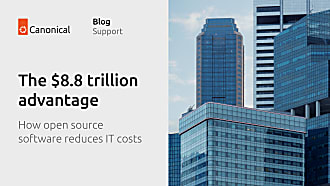Canonical
on 4 December 2012
How will consumerisation of personal devices affect the choice of OS?
Best of our webinars – (Relates to content in this webinar)
Along with the cloud, one of the big trends in corporate IT in recent years is the consumerisation of personal computing. Telecoms contracts have made smartphones affordable for nearly everyone, encouraging many business people to start using their iPhone or Google Android device for work. The popularity of Apple’s iPad is also forcing IT departments to start supporting and providing applications for the multitude of devices that have found their way into the office.
Once control freaks in terms of software versions and hardware specifications, IT departments are learning to live with diversity. This is having some interesting effects on the long-standing status quo.
Windows dominance under attack
On the desktop, it was assumed that Windows was the immovable object at the heart of business IT. Users’ familiarity with the system, the availability of Windows skills and ubiquitous application support all meant that Windows’ place was secure.
But with the advent of bring-your-own-device, this gospel is under attack. Suddenly business people of all types seem quite happy using a variety of operating systems. Why then stick with the same OS for the desktop? Many firms are at least considering what else it out there.
Software as a service
It would be a nightmare for IT to create different versions of applications for Windows PCs, Android devices, iPhones and iPads. Instead, there is a drive towards hosting applications in the cloud and delivering them as a service over the web or intranet.
These web apps also accommodate the strong demand from businesses for dynamic real-time collaboration. People can work together on the same documents, instead of emailing them back and forth. At the same time, software as a service helps companies exert more rigorous control over data and access to it. With a proliferation of devices, data on them can be easily lost or stolen; the risk is so much less keeping it in one place.
Developer preference may become a factor
What does this all mean for the future of the desktop? Well, if users and applications are no longer tied to a single client operating system, IT departments are free to choose one which costs less and requires less hardware investment, such as an open source Linux-based system.
Research group Redmonk suggests an early indicator of future operating system choice is current developer preference. A survey of nearly 2,000 developers using the Eclipse development environment on Linux shows that 56% favour Ubuntu on the desktop. The next closest is Fedora with just 14%.
Economics dictating desktop choice
Now Windows has to share its place in business with a number of other client operating systems, IT department can take a cold look at the economics. They are at liberty to choose a free desktop OS, such as Ubuntu. Unlike proprietary software, there is no penalty for the number of replicated images. They can launch applications, using external cloud service providers, with little or no capital investment and they can have greater control of their in-house applications.
The move away from Windows to a truly heterogeneous client environment will not happen overnight, but the consumerisation of IT is creating driving force in that direction.



